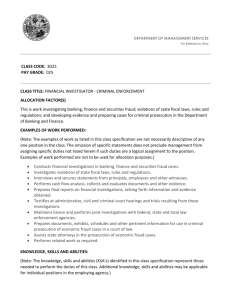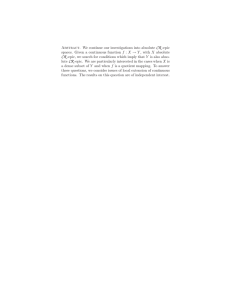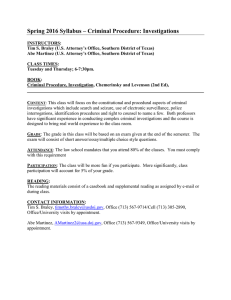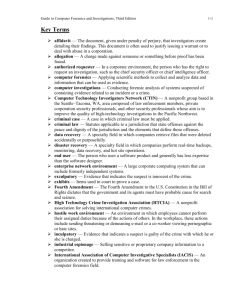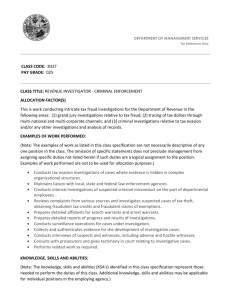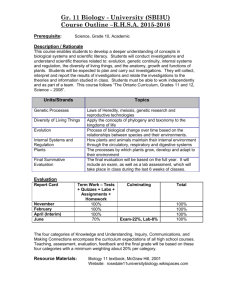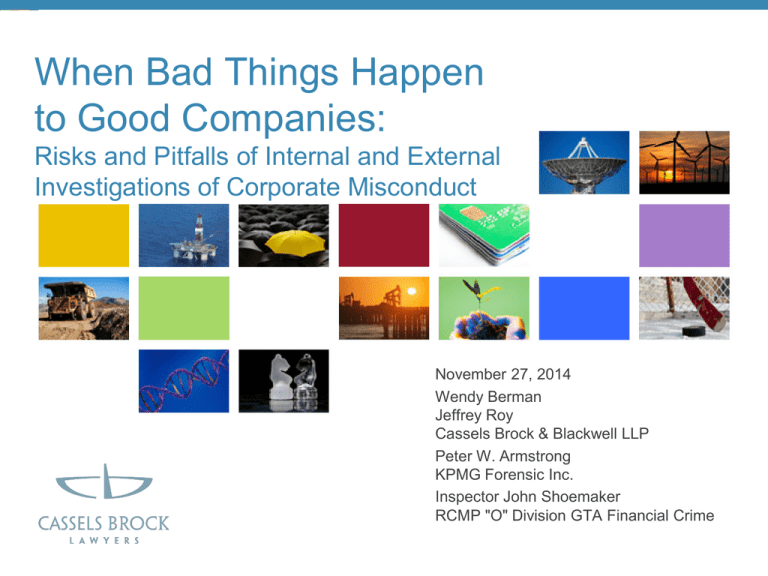
When Bad Things Happen
to Good Companies:
Risks and Pitfalls of Internal and External
Investigations of Corporate Misconduct
November 27, 2014
Wendy Berman
Jeffrey Roy
Cassels Brock & Blackwell LLP
Peter W. Armstrong
KPMG Forensic Inc.
Inspector John Shoemaker
RCMP "O" Division GTA Financial Crime
When Bad Things Happen to Good Companies:
Risks and Pitfalls of Internal and External Investigations of
Corporate Misconduct
slide | 2
What is your Company facing?
● Current environment: heightened scrutiny and public
mistrust
● Evolving legal regimes and enforcement trends
● Increased domestic and international collaboration
● Corporate and D&O liability
● Liability for actions of senior employees
slide | 3
RCMP
What is your Company Facing?
COMPANY
(and/or its
directors and
officers)
Multiple civil
proceedings
OSC
Criminal
Charges
What’s your Company Facing: Criminal and
Regulatory Enforcement Regime
● Multiple Canadian securities regulators
● Police Agencies
● Specialized units
● Enforcement priorities
● Fraud related offences
● Corrupt practices
● Market manipulation
● Disclosure violations
● Insider trading
● Increased domestic and international agency collaboration (JSOT, IMET)
slide | 5
What’s Your Company Facing: Anti-Corruption
Regime
CANADA
Corruption of Foreign
Public Officials Act
UNITED STATES
Foreign Corrupt Practices Act
UNITED KINGDOM
Bribery Act
Offence
• Offers or makes a bribe to a
foreign public official, directly
or indirectly
• Failure to maintain proper
books and records or hiding
evidence of bribery
• Offers or makes a bribe to a
foreign official
• Failure to maintain reasonably
detailed book s and records
• Failure to establish appropriate
internal controls
• Offers or makes a bribe to
a foreign public or private
official
• Requesting or accepting a
bribe
• Failure of an organization
to prevent bribery by those
acting on its behalf
Facilitation
Payment
Exemption slated to be
removed
Permitted in the context of routine
governmental action
Not permitted
Jurisdiction
• Canadian citizens, residents
or companies, regardless of
where the unlawful act is
committed
• “Real and substantial
connection” to Canada
• U.S. issuers, domestic
companies, and residents
regardless of where the unlawful
act is committed
• Anyone, with exceptions, acting
in U.S. Territory
• Any organization that has
a demonstrable business
presence in the U.K. and
associated persons
Penalty
Fine: Unlimited
Prison Term: 14 years
Other: Debarment
Fine: (Criminal) $2 million per
occurrence or twice the benefit
gained/loss avoided
Prison Term: 5 years
Other: Debarment
Fine: Unlimited
Prison Term: 10 years
Other: Debarment
slide | 6
What’s Your Company Facing: Securities
Regulatory Regime
● Disclosure violations (ss. 75, 77 and 78 Securities Act)
● Insider trading (s. 76 Securities Act)
● Fraud related offences (ss. 122 and126 Securities Act)
● Books and records offences (s. 19 Securities Act)
● Conduct contrary to the public interest (s. 127Securities
Act)
slide | 7
What’s Your Company Facing: Impact
Griffiths Energy
International
Investigation Costs
Penalty
$5 million
$10.35 million
SinoForest Corporation $50 million
Not determined Bankrupt
SNC-Lavalin
$50 million to date
Not determined
Wal-mart Stores Inc.
$439 million
Not determined
Avon Products Inc.
$344 million
Not determined
Siemens AG
$1 billion (including
$1.6 billion (US and Germany)
slide | 8
implementation of revised
internal controls)
(subject to debarment from World
Bank funded projects)
Prevention and Detection of Wrongdoing
● Multiple triggers for detection
●
●
●
●
●
●
●
slide | 9
internal surveillance
external surveillance
whistleblowers
media stories
competitors
social media
grassroots community organizations
Prevention and Detection of Wrongdoing
● Implementation of robust compliance regime
● Culture of compliance and “tone from the top”
● Policies and practices
● Effective training
● Effective due diligence, monitoring, detection and
response protocols
● Implications, risks and challenges
● Practical considerations for smaller organizations given
resource constraints
slide | 10
How to Respond: Critical First Steps
Internal investigations of potential wrongdoing
● Assess nature and scope of issues at play
● Assess key risks
●
●
●
●
●
slide | 11
Reputational
Criminal, regulatory and/or civil liability
Disclosure obligations
Internal controls and governance
Organizational
How to Respond: Critical First Steps
Internal investigations of potential wrongdoing
● Communications strategy – internal and external
● Early response and risk mitigation strategy
● Develop investigation plan
slide | 12
Step 1: Investigation Plan
● Structure, mandate and scope of internal investigation
● Independent or not?
● Assess need for external advisors
● Privilege protocol and considerations
slide | 13
Step 2: Internal Investigations: Gathering
information
● Documents and electronically stored information
● Scope, costs and time constraints
● Challenges relating to locating and securing data in multiple
jurisdictions for multiple custodians
● Challenges relating to local laws or culture
● Risk of inadvertent or deliberate destruction of
information
slide | 14
Step 3: Internal Investigations: Witnesses and other
sources of information
● Witnesses
● Interview protocol
● Challenges relating to local law and culture
● External sources of information
● Confidentiality
slide | 15
Step 3: Strategy for Dealing with
Government Authorities
● Consideration of whether, when and how to open a
dialogue with regulators and police
slide | 16
External Investigative Powers
Securities Regulators
Police Agencies
Document production requests
(ss.11, 13, 20,21 Securities Act)
Document Production Orders
(s.487.012 Criminal Code)
Voluntary and compelled interviews
(s.13 Securities Act)
No ability to compel interviews
Wiretaps (Part 6 Criminal Code)
Wired informants (Part 6 Criminal Code)
Search Warrants (s.487 Criminal Code)
Restricted sharing with police agencies
(Jarvis implications)
Confidentiality requirements
(ss. 16 and 17 Securities Act )
slide | 17
Full ability to share with other police and
enforcement agencies
Strategy for Dealing with Government Authorities:
Key Developments
● “Sea change” for police investigations
● Increasing use of more aggressive techniques, including
search warrants, wiretaps and wired informants
● use of external advisors
● Involvement of Crown counsel in investigative stage
● Increasing number of voluntary witness interviews
slide | 18
External Investigations: Strategy for Dealing with
Government Authorities and Key Considerations
● Determining who is target – company and/or individual(s)
● Cooperation protocol and terms
● Self-reporting calculus and credit for cooperation
slide | 19
External Investigations: Strategy for Dealing with
Government Authorities and Key Considerations
● Parallel or cross-border investigations
● Assess lead agency and level of coordination
● Differing legal regimes and jurisdictional considerations
● Differing approaches, funding, tools, and resources
● Protecting privileged information
● Use and sharing of information
slide | 20
The End of the Road?
Completion of the External Investigation
● Protocol for referral to prosecution
● Key steps and considerations
● Reporting to Crown counsel
● Protocols or regimes for negotiating global resolutions
● Ad hoc or formal?
● Practical considerations
slide | 21
The End of the Road?
Completion of the Internal Investigation
● Reporting internal investigation results
● Disclosure obligations
● Privilege and confidentiality considerations
● Mitigation and Remediation strategy
●
●
●
●
slide | 22
Organizational changes
Policy and practices changes
Litigation risk
Reputational and financial risks
When Bad Things Happen to Good Companies
“That’s another fine mess you’ve
gotten me into”
Laurel and Hardy
slide | 23
When Bad Things
Happen to Good
Companies:
Cassels Brock & Blackwell LLP
Suite 2100, Scotia Plaza
40 King Street West
Toronto, ON Canada M5H 3C2
Suite 2200, HSBC Building
885 West Georgia Street
Vancouver, BC Canada V6C 3E8
Tel: 416 869 5300
Fax: 416 350 8877
Tel: 604 691 6100
Fax: 604 691 6120
Risks and Pitfalls of Internal and
External Investigations of
Corporate Misconduct
© 2011–2014 CASSELS BROCK & BLACKWELL LLP. ALL RIGHTS RESERVED.
This document and the information in it is for illustration only and does not constitute legal advice. The information is subject to changes
in the law and the interpretation thereof. This document is not a substitute for legal or other professional advice. Users should consult
legal counsel for advice regarding the matters discussed herein.

